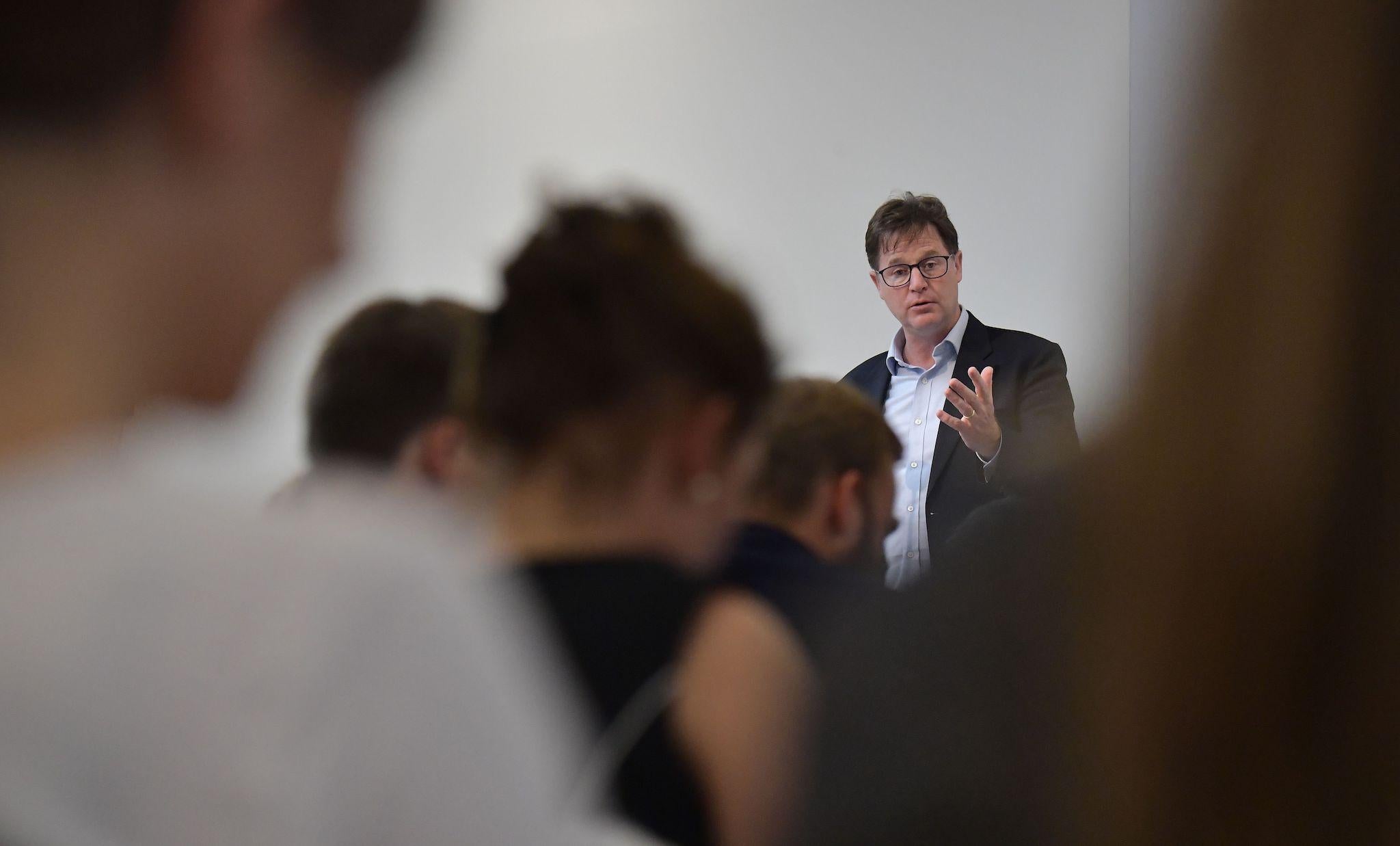Facebook PR boss Nick Clegg defends its decision to allow false political ads
Banning misleading ads would be an 'inappropriate power' for the social network, former deputy prime minister says

Your support helps us to tell the story
From reproductive rights to climate change to Big Tech, The Independent is on the ground when the story is developing. Whether it's investigating the financials of Elon Musk's pro-Trump PAC or producing our latest documentary, 'The A Word', which shines a light on the American women fighting for reproductive rights, we know how important it is to parse out the facts from the messaging.
At such a critical moment in US history, we need reporters on the ground. Your donation allows us to keep sending journalists to speak to both sides of the story.
The Independent is trusted by Americans across the entire political spectrum. And unlike many other quality news outlets, we choose not to lock Americans out of our reporting and analysis with paywalls. We believe quality journalism should be available to everyone, paid for by those who can afford it.
Your support makes all the difference.Facebook PR boss Nick Clegg has defended the company's decision to allow politicians to post false ads on the social network.
The former deputy prime minister said that it would be "inappropriate" if the social network were to ban misleading marketing from candidates.
The company has come under sustained criticism for its refusal to fact check the claims in politicians' ads in the same way it does other posts on the service.
Even Facebook employees have criticised the policy, with a group of them signing an open letter to leadership asking them to reverse their stance.
But the company has repeatedly claimed that fact checking would limit freedom of expression, and that users of the social network could choose whether to believe the claims in poliicians' posts.
Speaking on stage at the DLD Conference in Munich, Sir Nick said better regulation was needed in the tech sector and that it should not be down to private companies to decide on what constitutes truth.
"We have a major societal issue," said the former deputy prime minister.
"We have technologies which have erupted in a very short space of time," he said.
"This is a young industry which has erupted in a very short space of time and it has had huge transformative effects.
"I personally think that the net benefits to businesses, to communities, to families, to political movements and campaign movements, far outweighs the dark and the negative side.
"Our task as a society is to minimise the bad while protecting the good, and of course, that is a role which in the end must be done, in mature democracies, by legislators, by governments accountable to the people.
"In the end, it shouldn't be left to Google, Twitter or Facebook to make those decisions because it is not our democracy, it is the peoples' and the peoples' representatives who have to decide.
"So what I hope we can do is move beyond shouting at the problem - which I understand and a lot of problems have been created by the industry itself - to fixing it, and you can only fix it by legislators and regulators setting down new rules, just as they set down new rules for cars and every new technology which has ever erupted in the history of time."
The former Liberal Democrat leader also dismissed the suggestion that internet companies should more tightly police the content of adverts themselves.
Twitter announced last year that it had banned political advertising entirely on its platform.
Sir Nick acknowledged that Facebook's current approach was not as robust as some want - which is for tech firms to start vetting and fact-checking every claim made in political advertising - but he argued this would place private companies in the unsuitable role of deciding what should and should not be defined as truth.
"I know this from 20 years in politics, political speech is by definition a sort of form of caricature - politicians caricature their virtues, caricature their opponents' vices and the idea that private companies should be the people to draw that fine line seems to us and to other Silicon Valley companies as an inappropriate power," he said.
On Facebook's specific approach to political advertising, he claimed there had been "a lot of crossed wires" about Facebook's stance, and argued it was not an entirely new concept.
"Broadcasters in the United States, are not entitled under law, to block political advertisements because of the content of them," he said.
"So the stance that we're taking is not an outlier, it is a stance that has been in place in US politics for a long period."
He added that Facebook's launch of a political advert library and other controls around how and why users saw certain adverts were "industry-leading" in dealing with the issue of election interference.
"Facebook, far more than Twitter and Google, is investing in industry-leading transparency - and also giving users control, so if users don't want to see, or want to see fewer political ads, they can press a button and receive fewer political ads," he said.
"But crucially, unlike 2016 (in the US presidential election) or the Brexit referendum, where ads were run on Facebook apps and it was impossible for rival campaigners to see who was doing what, that has changed utterly.
"So now, campaigns in real-time can see who is paying for the ad, who they are trying to target, what their message is, what the different variants are of their message and so on."
Additional reporting by agencies
Join our commenting forum
Join thought-provoking conversations, follow other Independent readers and see their replies
Comments